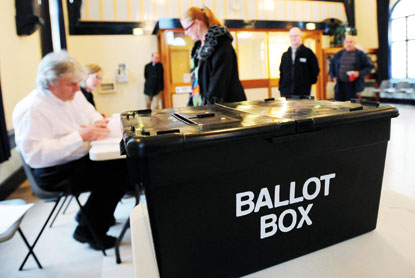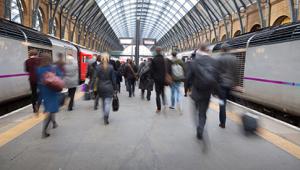
Less than a month after the government started to make a host of controversial changes to the welfare system, voters will go to the polls across England in a fresh test of support for the coalition’s deficit-reduction plans. Elections scheduled for May 2 will give residents in 37 counties, unitaries and mayoralties the chance to flex their democratic muscles for the first time since Prime Minister David Cameron came to power and began to cut government spending.
Chris Game, a visiting lecturer at the Institute of Local Government Studies, has analysed the upcoming contests. He says the results will reflect mid-term discontent with the coalition as cuts and benefit changes provoke a reaction to the party rather than anger at local councils.
‘If I’m a voter, then I have lots of incentives to vote against some of the cuts local authorities seem to be doing,’ Game tells Public Finance. ‘But if you have any sense of how these are coming about, you are more likely to blame the government.’
This means the results could be a mirror image of the 2009 elections, as Labour looks to reverse the gains made by Conservatives. Of the 27 counties going to the polls, the Conservatives have a majority in all but one, Cumbria, which is under no overall control.
Game says that Labour, which lost overall control of four of these authorities last time, should be on course to regain at least three – Derbyshire, Lancashire and Nottinghamshire.
David Sparks, leader of the Labour group in the Local Government Association, says he is hopeful of making gains in these areas. He tells PF the focus of the Labour campaign has been on spending cuts, including welfare cuts like the ‘bedroom tax’ that began in April.
‘I think this year’s local elections will be a continuation of the past couple of years where there’s a great deal of dissatisfaction with the coalition government in the north of England, and the coalition parties will lose seats.’
However, the impact that spending reductions have in different parts of the country could lead to a ‘varied’ picture, Sparks says. It is difficult to predict the impact of changes such as the localisation of council tax support. ‘Different areas have different priorities,’ he says.
Gary Porter, leader of the Conservative group in the LGA, certainly hopes the performance of councils that went Tory last time will protect them. But he adds the party is ‘bracing’ itself for some losses from the high point of 2009, when the Tories gained control of seven councils.
‘We have got some councils and councillors that we were surprised by and pleased to have won at the [2009] election and are likely to be in the most vulnerable group at the moment. But we’ve been checking on some of the work that they’ve been doing, and we’re pleased with their track record, and we hope against hope that that track record will sustain them.’
Porter hopes the party’s performance in both Nottinghamshire and Derbyshire specifically will be enough to repel a Labour advance in campaigns where local issues will be key. The council tax freeze grant, offered to councils for a third time by Whitehall and taken up by 60% of authorities, should also help the Conservative cause, he observes.
Gerald Vernon-Jackson, who leads the Liberal Democrats in the LGA, is frank that the party must improve on its recent showing in both the 2011 and 2012 local elections, where it lost 50% of its councillors each time.
The LibDems will be targeting their efforts in the Southwest, particularly Somerset and Cornwall – authorities lost to the Conservatives in 2009. ‘It’s where we have historically done well, and it’s an area where we want to continue to do well,’ Vernon-Jackson tells PF.
Good results for the LibDems in recent local by-elections offer hope the party is developing its campaigning skills while in government, he adds. ‘The last time we were in government in peacetime was in the 1920s, and not a lot of us remember it, so we are getting used to it. I think there’s an understanding that in government we are trying to stop the Conservatives from doing some of the stupider stuff they would want to do, but it’s still very tough.’
Game highlights the county contests to watch. He predicts Labour is likely to make gains in Warwickshire, where the authority is preparing for no party having overall control, and Worcestershire, where Labour has an outside chance of replacing the Conservatives as the largest party. If it is able to make big gains there, Worcestershire would be seen as a bellwether of the party’s momentum nationally, he adds.
In Staffordshire in 2009, Labour lost not just control, but all but three of its councillors; how it bounces back now will be key. Given the scale of the Labour wipe-out, regaining control ‘looks very difficult’, but Staffordshire has a strong Labour history, says Game, so is another authority that could prove a hung vote.
In the eight unitaries going to the polls, Labour can reasonably expect to become the largest party in Northumberland and in Bristol, where the LibDems currently run the council as a minority.
The two mayoral contests – in Doncaster and North Tyneside – are also likely to go to Labour, Game says.
But these predictions could be scuppered by two factors all parties agree are hard to predict: the turnout in the vote and the impact of the UK Independence Party’s growing support in national polls.
In 2009, elections were held alongside the vote for the European Parliament, and only 34.5% of voters cast their ballot. Porter warns that the turnout could fall even lower this year to become the worst in local elections for two decades.
Game suggests the turnout could prove more resilient than feared, as people who voted in European elections will be likely to vote in county polls.
He adds that the great unknown will be the performance of Ukip, whose high standing in national opinion polls and strong showing in recent Westminster by-elections will give them a new prominence in this campaign. The party gained a total of seven councillors in these contests four years ago.
Ukip is fielding a record slate of 1,727 candidates across the country, compared to estimates of 2,249 for the Conservatives, 2,165 for Labour and 1,760 for the LibDems.
‘The story of these elections will be how Ukip is doing,’ says Game. Running the 2009 local elections along with the Europeans probably gave the party a 2–3% boost.
‘But they’re now back in normal elections,’ adds Game. ‘Will they find it as difficult as they ever do under our voting system?’
It is not long now before all of the political parties – and the rest of the country – find out.
This article first appeared in the May edition of Public Finance

![]()






















